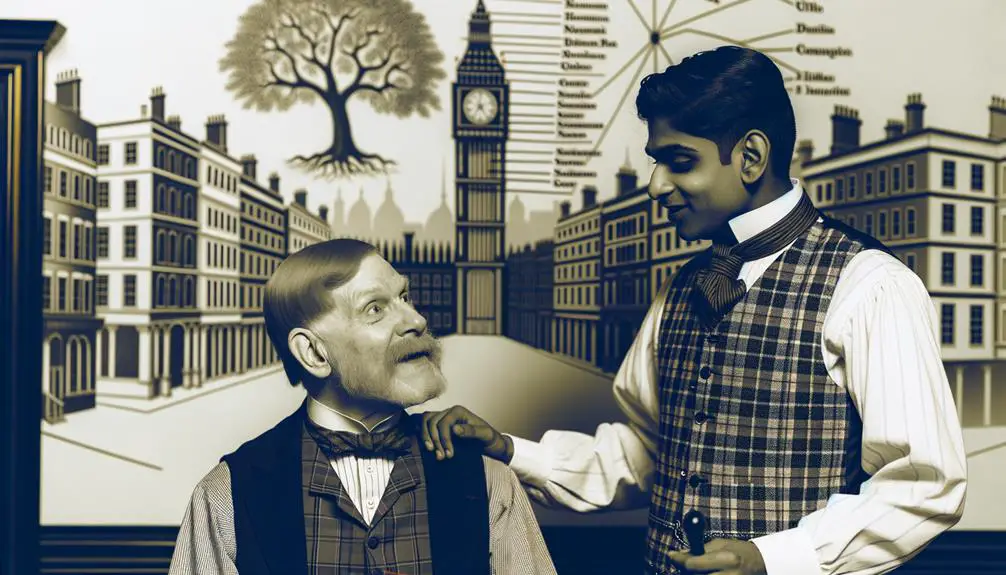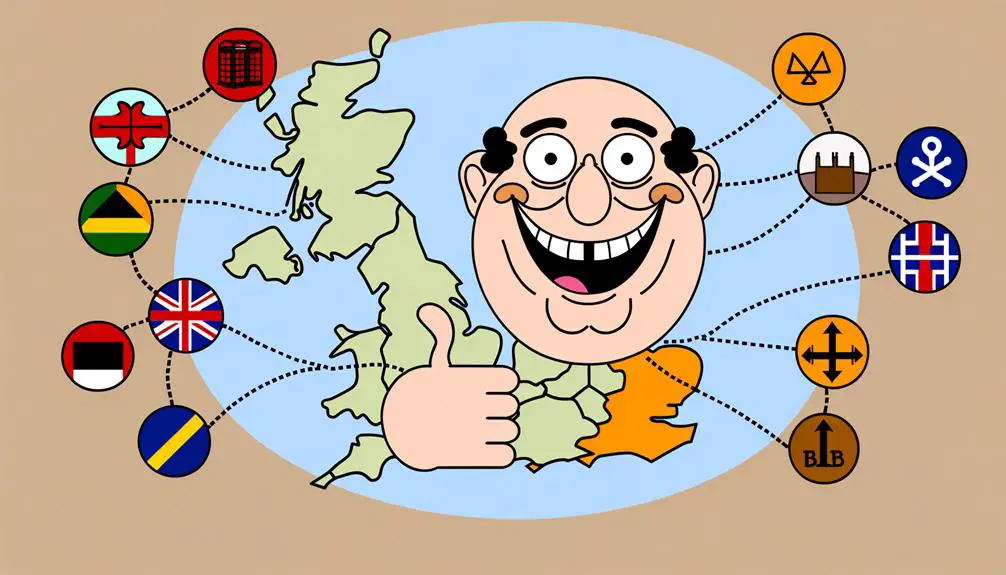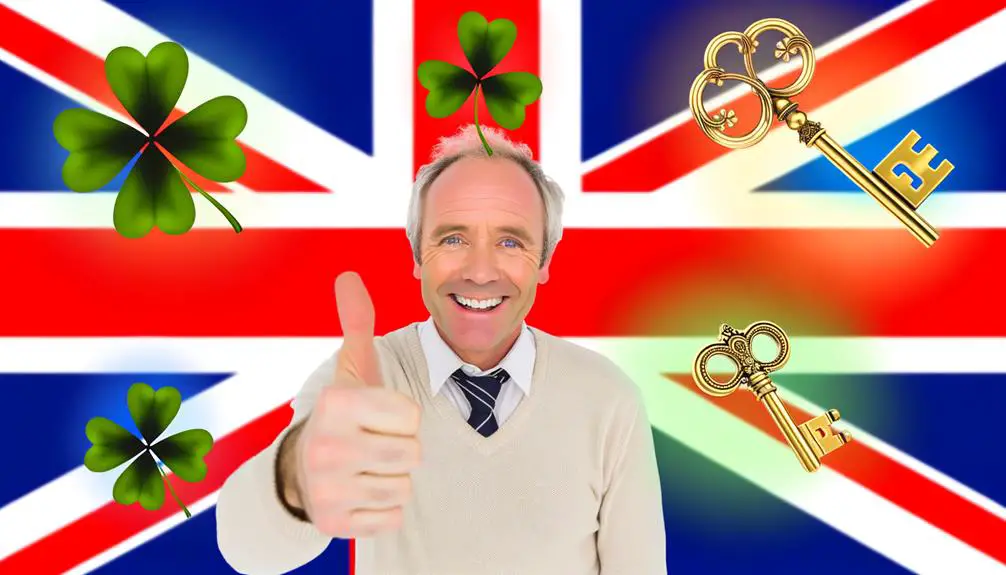In British slang, 'Bob's your uncle' emerges as a phrase connoting the simplicity and assuredness with which you can accomplish a task or achieve a desired outcome. This expression, woven into the linguistic fabric of the 19th century, reveals an intersection of social history and language evolution, deeply entwined with societal norms and the political landscape of the time. Its roots illustrate the dynamics of nepotism and favoritism, invoking a sense of effortlessness in achievement. The enduring popularity of this idiom not only enriches the English language with its unique cultural nuances but also underscores the cultural value of idiomatic expressions. Exploring this phrase further exposes a rich tapestry of linguistic diversity and cultural significance that spans across British regions, embodying a linguistic bridge that facilitates a shared understanding and collective identity among its speakers.
Key Takeaways
- "Bob's your uncle" is a British slang phrase signifying that a task is completed or a result successfully achieved.
- It implies a process is simpler or more straightforward than one might think, often used to conclude explanations.
- The phrase has roots in societal norms and political landscapes, reflecting nepotism or favoritism historically.
- Its popularity and enduring use highlight the cultural value of idiomatic expressions within British English.
- Across different British regions, "Bob's your uncle" may carry slight variations in meaning and usage, showcasing linguistic diversity.
The Origins of the Phrase

Delving into the origins of the phrase 'Bob's your uncle,' it's important to grasp that this quintessentially British expression emerged from the linguistic tapestry of the 19th century, reflecting a fascinating intersection of social history and language evolution. The historical context surrounding its inception is deeply rooted in the societal norms and political landscapes of the time, offering a rich backdrop against which the phrase's popularity can be comprehended.
The etymological debate around 'Bob's your uncle' is both intricate and multifaceted, suggesting that its emergence was no mere accident of linguistics but a reflection of the cultural zeitgeist. Scholars argue that the phrase encapsulates more than just a colloquialism; it serves as a linguistic artifact, illuminating the dynamics of nepotism and favoritism prevalent in the era's socio-political environment. This perspective invites a deeper analytical exploration, challenging one to ponder not only the words themselves but also the social currents that carried them into common parlance.
Understanding 'Bob's your uncle' within its historical and etymological dimensions provides a window into the past, showcasing how language evolves in tandem with society, embedding within it the stories and peculiarities of its time.
Meaning and Usage
Having explored the rich historical and etymological roots of 'Bob's your uncle,' let's now examine its contemporary meaning and how it's used in various contexts. In modern parlance, this phrase epitomizes the quintessence of idiomatic expressions within British slang, serving as a colloquialism that conveys the completion of a task with ease or the successful achievement of a desired outcome. Its utilization in conversation underscores an inherent simplicity or straightforwardness, effectively encapsulating the notion that no further explanation is required.
Delving into the conversational nuances, 'Bob's your uncle' is often deployed at the conclusion of a set of instructions or explanations, acting as a verbal punctuation that reassures the listener of the uncomplicated nature of the task at hand. This idiomatic expression enriches the tapestry of English language by offering a colorful method to convey assurance and certainty. Its usage transcends mere linguistic function, embodying the cultural penchant for understatement and dry wit characteristic of British communication.
In essence, 'Bob's your uncle' is both a linguistic relic and a living attestation to the dynamic nature of language, adapting over time while retaining its core significance. Its enduring popularity underscores the cultural value placed on idiomatic expressions as tools for nuanced, effective communication.
Variations Across Regions

Exploring the phrase 'Bob's your uncle' reveals intriguing variations across different British regions, each adding a unique flavor to this quintessential piece of slang. As you investigate further into the regional dialects, it becomes apparent how linguistic evolution has played a pivotal role in shaping the phrase's usage and interpretation. In the bustling streets of London, 'Bob's your uncle' is often delivered with a swift, matter-of-fact tone, reflecting the city's rapid pace of life. Contrastingly, in the serene landscapes of the Scottish Highlands, the same phrase might carry a more leisurely, melodic intonation, embodying the region's tranquil ethos.
This regional diversity isn't merely phonetic but extends to semantic nuances as well. In some areas, the phrase might emphasize the ease of achieving a task, while in others, it highlights the finality of a process, showcasing a rich tapestry of meanings across the British Isles. The study of these variations offers a fascinating glimpse into the dynamic interplay between language and locale, underscoring the importance of regional dialects in the continuous process of linguistic evolution. Through this lens, 'Bob's your uncle' serves as a vibrant emblem of British linguistic diversity, adapting and thriving in the rich soil of regional expression.
Cultural Significance
The phrase 'Bob's your uncle' encapsulates a rich cultural tapestry within British society, serving as a linguistic bridge between generations and social strata. Its endurance and versatility underscore its deep-rooted societal impact, reflecting both the continuity and the adaptability of language evolution within the British Isles. You'll find that its simplicity belies a complex interplay of historical, social, and cultural dynamics that have shaped its usage and interpretation over time.
Delving deeper, the phrase's ubiquity across various contexts has facilitated a shared understanding, contributing to a sense of collective identity among Britons. It acts as a colloquial marker, demarcating in-group familiarity and reinforcing social cohesion through shared linguistic heritage. Additionally, its persistence in contemporary discourse highlights the dynamic nature of language, adapting to new societal norms while retaining its quintessential British character.
Through its widespread use, 'Bob's your uncle' also serves as a attestation to the societal impact of language evolution. It mirrors societal changes, adopting new meanings and usages that reflect the zeitgeist of different eras. This linguistic phenomenon not only enriches the tapestry of British English but also invites scholarly exploration into how language shapes and is shaped by the sociocultural milieu.
Famous References and Uses
'Bob's your uncle' has permeated various facets of popular culture, reflecting its significant role in British identity and societal norms. This phrase's journey from a colloquialism rooted in historical context to a staple of linguistic evolution in the UK demonstrates its flexibility and enduring appeal. Its presence in literature, cinema, and music underscores the adaptability of language to encapsulate societal shifts and attitudes. By analyzing the deployment of 'Bob's your uncle' across different media, one can trace the contours of British cultural evolution and the ways in which language acts as a repository for collective memory and identity.
Famous references to 'Bob's your uncle' offer a window into its multifaceted uses and meanings. In film and television, it often punctuates dialogues with a quintessentially British flair, serving both as a comic relief and a marker of cultural authenticity. Musicians and writers have employed it to evoke a sense of immediacy and familiarity, bridging the gap between the vernacular and the artistic. Each usage not only reaffirms the phrase's place in the lexicon but also contributes to its ongoing linguistic evolution, illustrating the dynamic interplay between language, culture, and identity.







